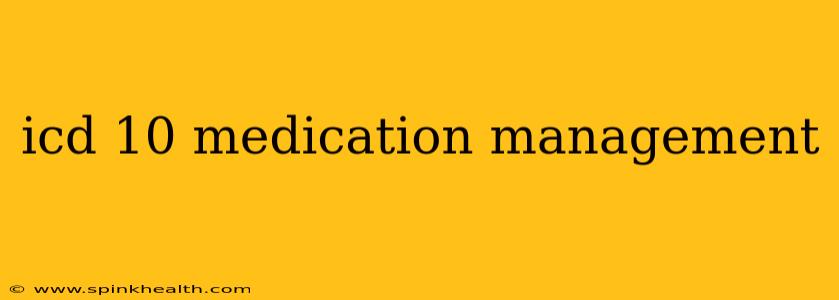ICD-10 Codes for Medication Management: Navigating the Complexities of Clinical Documentation
The world of healthcare coding can feel like navigating a dense forest, especially when dealing with nuanced areas like medication management. ICD-10 codes, the international standard for classifying diseases and related health problems, play a crucial role in accurately reflecting a patient's condition and the services they receive. But when it comes to medication management, the codes aren't always straightforward. This isn't about prescribing medications; it's about the management of those medications, the ongoing process of monitoring, adjusting, and providing support to patients.
Let's embark on a journey to understand how ICD-10 codes relate to medication management, addressing some common questions along the way.
What ICD-10 codes are used for medication management?
There isn't a single, dedicated ICD-10 code specifically for "medication management." Instead, the appropriate code depends entirely on the reason for the medication management. The code reflects the underlying medical condition requiring the medication and the level of management needed. For example:
-
Conditions requiring complex medication regimens: If a patient has multiple chronic conditions (like diabetes, hypertension, and heart failure) each requiring separate medications, the codes would reflect those individual conditions (e.g., E11.9 for type 2 diabetes, I10 for essential hypertension, I50.9 for heart failure). The complexity of managing these medications would be reflected in the level of care documented in the medical record.
-
Medication-related adverse effects: If a patient experiences an adverse reaction to medication, the code will reflect the adverse effect itself (e.g., T36.0 for medication allergy). This code would then be used in conjunction with the code for the medication causing the reaction.
-
Substance use disorders: For patients with substance use disorders, codes from the F10-F19 category are used, specifically reflecting the type of substance and the severity of the disorder. Medication-assisted treatment (MAT) is often a crucial part of managing these disorders.
-
Non-compliance: While not directly coded, a lack of medication adherence may be implied in notes indicating the need for increased patient education or support to improve adherence. The underlying condition requiring medication should still be coded.
How is medication management documented for billing purposes?
Accurate documentation is paramount. The medical record needs to clearly demonstrate:
-
The specific condition(s) requiring medication. Vague descriptions are insufficient. The diagnosis needs to be precisely stated, aligning with the ICD-10 codes.
-
The type and dosage of medications prescribed. This is essential for tracking medication efficacy and potential side effects.
-
The frequency and methods of medication administration. This ensures a clear understanding of the patient's regimen.
-
The level of care involved in managing the medication. This might include monitoring vital signs, adjusting medication dosages, patient education, and follow-up appointments. The complexity of the regimen and the level of intervention should be meticulously documented to support the services billed.
-
Evidence of patient education and counseling. This shows a commitment to helping the patient understand their medications, improve adherence, and recognize potential issues.
What are some examples of medication management situations and their corresponding codes?
Let’s paint a picture. Imagine a patient with Type 2 diabetes (E11.9) and hypertension (I10). Their medication management involves regular blood glucose and blood pressure monitoring, medication adjustments based on these readings, and patient education on diet and lifestyle changes. The codes used would be E11.9 and I10, with the level of care and complexity of the management documented in detail to support the medical billing process. If the patient develops an adverse reaction to a medication (let’s say, a rash, T36.1), that code would be added as well.
What's the difference between medication management and medication reconciliation?
Medication reconciliation is a process of creating the most accurate and complete list possible of all the medications a patient is currently taking. This list includes all prescribed medications, over-the-counter drugs, and supplements. Medication management is the ongoing process of overseeing the patient's medication regimen, making adjustments, providing education, and monitoring for adverse effects. Reconciliation is a step within the broader context of medication management.
Are there specific CPT codes for medication management?
No, there isn't a single CPT code for "medication management." The billing codes used depend on the specific services provided, such as office visits (99211-99215), time-based codes for counseling (99401), and medication reconciliation (99354). The correct code set depends on the nature and extent of the services provided.
Navigating ICD-10 codes for medication management requires careful consideration of the underlying medical conditions and the complexity of the care provided. Precise documentation is crucial for accurate coding and billing, ensuring appropriate reimbursement for the time and expertise invested in providing effective patient care. Remember, this information is for educational purposes only; always consult with a qualified medical coding specialist for guidance on specific situations.

